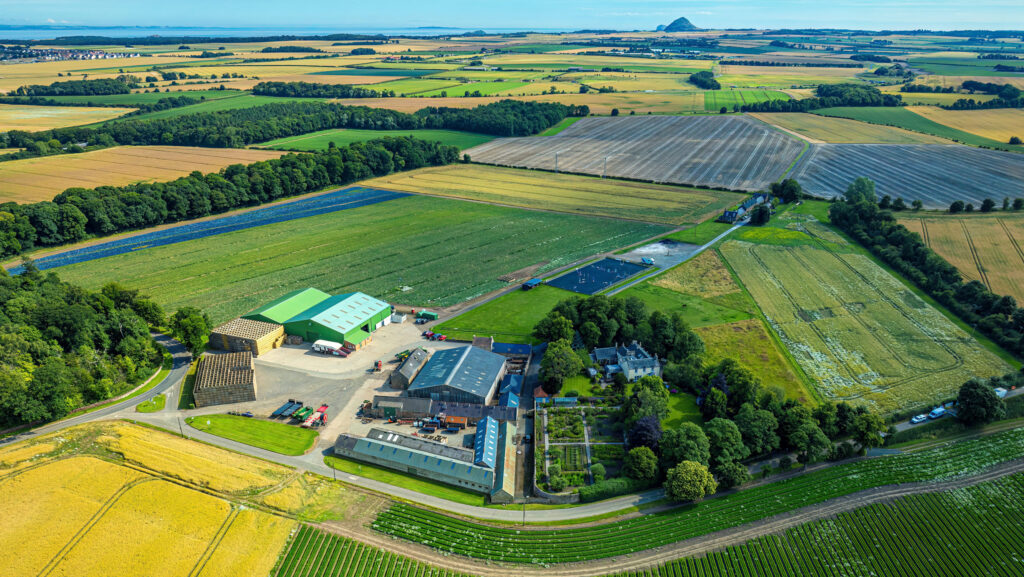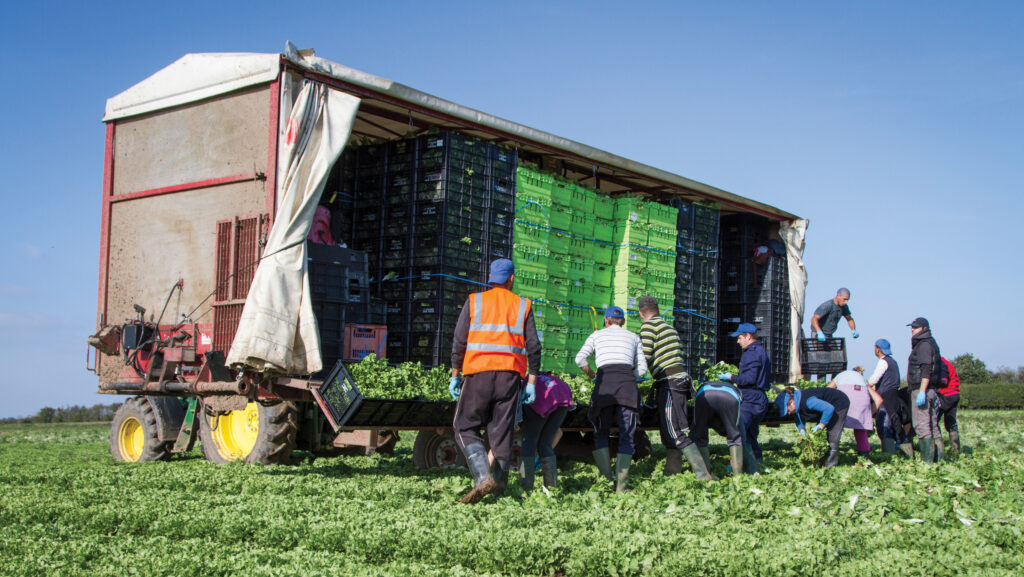Opinion: Zeichner sets out his vision for the future of farming
 Daniel Ziechner © Tim Scrivener
Daniel Ziechner © Tim Scrivener Farming minister Daniel Zeichner reflects on the challenges facing farmers, and how Defra can help deliver a more profitable future.
He also answers questions sent to Farmers Weekly by farmers around the country in a Q&A.
Britain’s fields are brimming with activity, with arable farmers across the country getting crops into the driers and grain stores.
These harvest scenes are a hallmark of the British countryside and farming life.
They’re mixed in with another great summer tradition that has agriculture at its heart – the country show – something I always look forward to, as it is a chance to leave Westminster behind and meet farmers face-to-face.
See also: Defra opinion tracker reveals dwindling farmer confidence
Whether you’re an exhibitor, a visitor with children in tow, or an invited guest – as I have luckily been this summer – these events are a remarkable window into rural life.
Each event’s pride in farming’s history is self-evident – whether it’s the Royal Highland Show, where I was warmly welcomed by NFU Scotland, or the ever-impressive Great Yorkshire Show, where I enjoyed a thoughtful discussion over lunch with farmers and Mayor David Skaith.
But I also heard concerns for farming’s future, with climate change, extreme weather, and rising costs affecting profits.
I acknowledge there were difficult questions for me too, including those on inheritance tax changes.
I understand that many of you will disagree with our changes, but as the farming minister, I will always listen and explain our thinking.
What has been great to see is the energy and enthusiasm for innovation. At Groundswell and the Game Fair, I saw first-hand how farmers are confronting the challenges ahead by using regenerative agriculture to shape a more resilient future.
This kind of nature-positive farming is not just good for the environment, it is key to long-term profitability. That is why we are backing it with action.
I firmly believe that our Environmental Land Management schemes are the best tools to support the farming sector’s transition to sustainable food production and profitability.
Over the next four years, funding for these schemes – paid directly into your pockets – will increase by 150% – from £800m in 2023-24 to £2bn by 2028-29 – helping you to transition to sustainable food production while boosting profits.
We know that for farm businesses to thrive, they need to be profitable – and a big part of my job is to help make that possible.
It was promising to see profits increase by 26% last year, and we have also appointed Baroness Minette Batters to explore how we can further boost farm incomes and make support work better.
I also meet regularly with farmers and growers to hear what is needed.
These sessions are instructive and have helped shape some of the key aspects of our new deal for farmers, including extending the seasonal worker visa – giving farms a pipeline of workers and more certainty to grow their businesses.
We are also launching hundreds of millions of pounds in grants, making sure we create opportunities for exports in new trade deals, and slashing red tape for EU exports to put more money in farmers’ pockets.
While you are busy in the fields bringing in the harvest, I will be working to champion farming back in Westminster.
Later this summer, we will provide an update on the Sustainable Farming Incentive and our reforms to make this scheme better, so that we support a nature-friendly and resilient farming industry that’s fit for the future.
Q&A: Daniel Zeichner answers farmers’ questions…
Given your years of experience, how would you advise the farming community to best lobby the Treasury and government to open a constructive dialogue on inheritance tax and find a better way forward? James Small, Somerset
I understand the strength of feeling on this issue.
As farming minister, I am committed to listening carefully, but also to being candid – I have been clear that this policy is unlikely to change.
The chancellor needed to raise funds at the Autumn Budget to stabilise the economy and before this change £219m of relief was going to just 117 estates. That was not sustainable.
The government believes our approach to inheritance tax (IHT) is fair and balanced.
Our reforms to agricultural and business property relief will help fund vital public services while protecting most estates.
Three-quarters of estates will still pay no IHT and the rest will pay about half of what most people pay. Those payments can be spread over 10 years, interest-free.
Promises from opposition parties should be treated with care.
The opposition front bench has already made numerous promises with no explanation of how they will be paid for.
That is unlikely to survive contact with a General Election campaign, let alone collision with the financial markets – we are all still paying the cost of the Liz Truss debacle.

Mr Zeichner is adamant that most farms won’t pay inheritance tax when passed on to the next generation © Adobe Stock
How do you expect UK agriculture to survive when we have a very high-cost base and are trying to compete with substandard imports from countries where production is subsidised and farmers don’t face inheritance tax?
George Atkinson, Lincolnshire
Food security is national security, and British farmers are right at the heart of it. Profitability must come first.
That’s why we have asked Baroness Batters to lead a review on how we can improve farm profits across the board.
Her work will help shape the National Food Strategy, the Farming Roadmap and the Land Use Framework, making sure our plans are joined up and focused on what really matters.
As well as backing farmers with £11.8bn in support for sustainable food production, we are standing up for farmers in trade talks, including with India and the US, by keeping the UK’s high standards and creating new opportunities to export quality British food.
We’re also cutting unnecessary red tape to boost trade with the EU.
The issues around differing standards are not new; other countries of course have different tax systems and labour costs.
But most of our trade is with the EU and aligning more closely on standards helps tackle this long-standing issue, as does once again engaging constructively with the wider world.
The National Food Strategy and Farming Roadmap will go hand in hand – supporting a fairer, greener, more resilient food system that works for British farmers.
You claim this government is spending more money than ever on farming. With the Basic Payment Scheme all but gone, the Sustainable Funding Incentive (SFI) suspended, and Higher Tier Countryside Stewardship not yet open, do you accept that most of this money simply isn’t finding its way onto farms?
George Atkinson, Lincolnshire
I’m really proud of the record £11.8bn we have secured for sustainable farming and food production over this parliament.
I firmly believe that our Environmental Land Management schemes are the best tools to support the farming sector’s transition to sustainable food production and profitability.
Payments from schemes continue to reach farmers’ pockets.
There are already 39,000 live SFI agreements in place which will help farmers take up groups of actions that, when done together, deliver more for nature.
As we said at the time, every payment in every ongoing agreement is being honoured.
The SFI itself is not closed; it is closed to new applications. Looking ahead, we will start accepting applications for the reformed SFI offer in 2026.
Elsewhere, money is getting out the door via the capital grants offer.
I was delighted to see such demand for this and strong momentum behind nature-friendly farming.
We inherited a situation where the farming budget had been underspent for years, but we are ensuring it is spent and gets into farmers’ pockets.
When the new SFI reopens in January 2026, will I be able to exit our old uplands Entry Level Stewardship scheme without losing both money and time, and transfer easily to the SFI?
Gemma Bland, Cheshire
I’m really grateful to you and the thousands of other farmers who are already delivering valuable environmental outcomes through our previous agri-environment schemes.
Right now, we’re working hard on updating the SFI scheme, so it better focuses funding where it counts most – for food, farming and nature.
We’ll be sharing more details about our plans later this summer and will keep working closely with farmers and industry stakeholders to shape the scheme, including who can apply, before it opens next year.
Good R&D is the key to productivity growth in any sector, yet in agriculture, farmers are never involved or rewarded. How does Defra’s new Adopt fund make it easier for pioneering UK farmers to access innovation funding to reward and develop their unrecognised talent?
Tom Allen-Stevens, Oxfordshire
Innovation is key to growing any sector, and this government has committed to at least £200m of funding to the Farming Innovation Programme up to 2030 as part of the Industrial Strategy.
The Adopt fund is the result of time spent learning from what works well within other funds and ensuring farming sectors are at the forefront.
It will provide collaborative, farmer-led innovation grants to farmers and farm businesses trialling new technology and practices on their farm.
To encourage participation from farmers who may not have experience with innovation funding, a dedicated support hub has been established, and support grants are available that allow farmers to work with specialist facilitators to develop their plans.
Round 2 is currently open and we look forward to the high-quality projects from Round 1 starting up.
Will you commit to halting the current post-Brexit shift toward import dependency for fresh produce and support a full revival of UK horticulture – or is this sector being quietly abandoned in favour of global agri-business?
Liz Webster, Wiltshire
I understand the concerns about the future of UK horticulture, especially as rising costs and global competition continue to challenge growers.
UK-grown vegetables currently make up about 53% of our total supply.
This shows how important domestic production remains, something our cross-government National Food Strategy is working to protect, but we want to do more, particularly in a country that used to grow far more of our own fruit.
That strategy is about more than food security; it’s about supporting economic growth, protecting the environment and helping people lead healthier lives.
Everyone deserves access to a healthy, varied diet and the freedom to make informed food choices.
To support the sector, I regularly meet with growers to listen and understand what’s needed.
We’ve extended the seasonal worker visa route by five years and, earlier this year, we announced £45.6m in new Farming Innovation Programme grants.
We’re also exploring ways to reduce costs, including through an ambitious sanitary and phytosanitary (SPS) agreement with the EU to cut red tape and make it easier for businesses to trade efficiently and competitively.
For horticulture, that matters. It’s a valuable sector, with trade worth about £9m a year.

Mr Zeichner says the government is committed to growing the nation’s horticultural output © GNP
Public sector workers are being given pay increases again and again, while farmers are being advised by the government to “do more with less”. As Defra farming minister, shouldn’t you be fighting our corner rather than towing the party line?
William Tyrrell, Lincolnshire
Many farm businesses are already very efficient, but we want to work with others to see how they can improve and deliver a more sustainable business for the future.
Our recent capital grants are a sign of this, where we have put £150m into items that help farm businesses but also deliver for nature and the environment.
As for battling within government, it was recently put to me at a parliamentary committee by a senior Conservative MP that there should be “blood on the floor”.
My response is that there are many ways of doing politics, but I’m not convinced that “blood on the floor” served the sector well in the past.
My approach is different: marshal the evidence, make the case and be very persistent.
Before the Spending Review, it was widely reported that the Defra budget would be slashed.
Secretary of state Steve Reed achieved a very good outcome which was praised publicly by leading industry figures.
No blood on the floor, just a good outcome – which is what I want for the sector.
Given the disconnect between policymakers and real farming, shouldn’t all Defra, Environment Agency and Rural Payments Agency staff be required to undertake some form of on-farm practical training or experience?
Steve Taylor, Lancashire
Practical experience really matters and to help with this all our new field officers receive on-farm training, including a week at Sparsholt College, and spend time out shadowing experienced officers.
Beyond that, we run farm visits across different types, sizes and tenancies to help staff explore key policy areas like soil health, uplands and tenancy.
It is also important to balance this against other sorts of learning.
For example, we need staff to keep developing great digital skills or going and seeing how other industries operate so that they can help bring that knowledge to the farming sector too.
Other ways we try and listen are through co-design, workshops in auction marts, and more than 40 agricultural shows each year, where colleagues from across Defra and its agencies speak with thousands of farmers face-to-face.
My general experience of working with Defra colleagues is that they are eager to listen and learn.
What’s your view…?
Share your thoughts by sending your letters to philip.clarke@markallengroup.com
